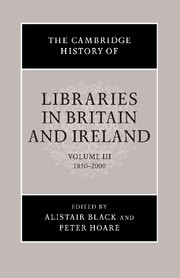Book contents
- Frontmatter
- Introduction: sources and methodologies for the history of libraries in the modern era
- 1 Libraries and the modern world
- Part One Enlightening the Masses: the Public Library as Concept and Reality
- Part Two The Voluntary Ethic: Libraries of our Own
- Part Three Libraries for National Needs: Library Provision in the Public Sphere in the Countries of the British Isles
- Part Four The Nation's Treasury: Britain's National Library as Concept and Reality
- Part Five The Spirit of Enquiry: Higher Education and Libraries
- 26 Introduction: Higher education and libraries
- 27 The libraries of the ancient universities to the 1960s
- 28 The libraries of the University of London to the 1960s
- 29 The Civic universities and their libraries
- 30 Academic libraries and the expansion of higher education since the 1960s
- Part Six The Rise of Professional Society: Libraries for Specialist Areas
- Part Seven The Trade and its Tools: Librarians and Libraries in Action
- Part Eight Automation Pasts, Electronic Futures: the Digital Revolution
- Bibliography
- Index
- References
29 - The Civic universities and their libraries
from Part Five - The Spirit of Enquiry: Higher Education and Libraries
Published online by Cambridge University Press: 28 March 2008
- Frontmatter
- Introduction: sources and methodologies for the history of libraries in the modern era
- 1 Libraries and the modern world
- Part One Enlightening the Masses: the Public Library as Concept and Reality
- Part Two The Voluntary Ethic: Libraries of our Own
- Part Three Libraries for National Needs: Library Provision in the Public Sphere in the Countries of the British Isles
- Part Four The Nation's Treasury: Britain's National Library as Concept and Reality
- Part Five The Spirit of Enquiry: Higher Education and Libraries
- 26 Introduction: Higher education and libraries
- 27 The libraries of the ancient universities to the 1960s
- 28 The libraries of the University of London to the 1960s
- 29 The Civic universities and their libraries
- 30 Academic libraries and the expansion of higher education since the 1960s
- Part Six The Rise of Professional Society: Libraries for Specialist Areas
- Part Seven The Trade and its Tools: Librarians and Libraries in Action
- Part Eight Automation Pasts, Electronic Futures: the Digital Revolution
- Bibliography
- Index
- References
Summary
Why these universities or colleges should be only at Cambridge and Oxford, I know no reason … doubtless it would be more suitable and more advantageous to the good of all the people, to have universities or colleges, one at least, in every great town or city in the nation, as in London, York, Bristol, Exeter, Norwich and the like: and for the state to allow these colleges an honest and competent maintenance, for some godly and learned men to teach the tongues and arts, under a due reformation. And this the state may the better do, by provision out of every county, or otherwise, as shall be judged the best, seeing then there will be no such need of endowment of scholarships; inasmuch as the people having colleges in their own cities, near their own houses, may maintain their children at home, whilst they learn in the schools; which would indeed be the greatest advantage to learning that can be thought of.
William Dell, Master of Gonville and Caius College, Cambridge, 1653Much has been written about the spread of education in England before, during and after the industrial revolution. Many of the publications touch on the emergence of the Civic universities and a few deal directly with their origins, birth and early development. Inevitably, much that has been published has implications for their libraries but, apart from occasional comparative studies and references in the history of individual universities, these have rarely been considered in a general library context. University libraries are essentially corollaries of their universities and their modus vivendi and modus operandi are to a very large extent determined by them. In the case of the Civic university libraries, this is specially important, for their distinctive origins and early history set them apart from the libraries of Cambridge, Oxford and the ancient Scottish universities, and also from most of the later foundations.
- Type
- Chapter
- Information
- The Cambridge History of Libraries in Britain and Ireland , pp. 357 - 376Publisher: Cambridge University PressPrint publication year: 2006

